Fishing in Provincetown, Massachusetts goes back centuries, well before the Pilgrims arrived on the Cape's sandy shores.
In fact, fishermen of a bygone era once landed mammoth 100 plus pound codfish, door-size halibut, haddock, and a variety of other valuable fish species right off the P-town coast.
The fishing today may not be as incredible, but it's still pretty darn good. Just a few years ago there were several 1,000 pound giant bluefin tuna caught within sight of Provincetown's Race Point Beach. Large schools of striped bass and bluefish also show up at Provincetown throughout the course of spring, summer and fall.
As with most Cape Cod fishing spots, Provincetown fishing changes from season to season.
I recall one year where the bass schools were so dense that my sonar began to malfunction. The next summer I couldn't find a fish anywhere. I guess that is what keeps fishing in this area so interesting and exciting.
In this article, I would like to share with you my experiences and knowledge of fishing the Provincetown area for striped bass, bluefin tuna and other species. Please scroll below to continue reading.
Provincetown Fishing Opportunities
If you look on a map, then you will clearly see how well positioned the town of Provincetown MA is for fishing.
PTOWN (as Provincetown is often referred to by locals) is at the very tip of Cape Cod, with Cape Cod Bay to the west and the mighty Atlantic Ocean to the east.
Provincetown Harbor is a naturally-made, near perfect deep-water anchorage for ships. The harbor and geographical characteristics of Provincetown has attracted fishermen and their ships for thousands of years.
Extensive written records of indigenous peoples utilizing the Provincetown region for fishing are hard to come by, but there is little doubt in my mind that the indigenous Nauset and Wampanoag Native Americans must have fished here extensively.
Scroll below to learn more details about all the different types of fishing available in this special region of Cape Cod.
Fishing Provincetown From Shore
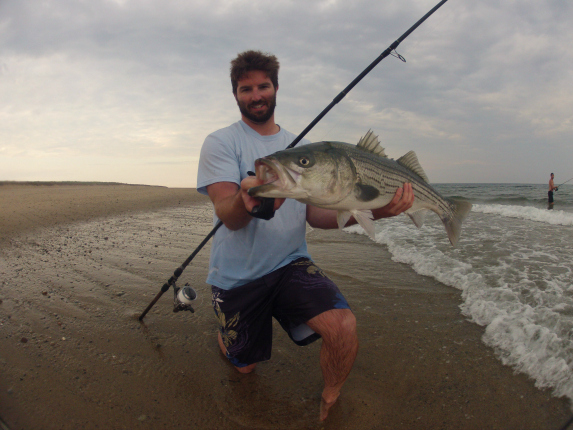
Provincetown is famous for its surfcasting. Decades ago, before the seals began to inundate the beaches of the Outer Cape, surfcasters would catch 50 pound bass, 10 pound bluefish, pollock and even tuna from shore. Can you imagine what that must of been like?
The shore fishing is a bit more challenging these days, but if you login your time you can still find a good bite from the beaches of Provincetown. If you get lucky you may even encounter a striped bass blitz like the one I experienced during June of 2013.
Click play below to watch!
For bass and blues from shore, night time is definitely the right time at Provincetown. Swimming plugs and live eels are good choices. During the day chunking or fishing fresh dead sand eels is a good idea.
I've had my best luck surfcasting the beaches of Provincetown during the first part of the incoming tide. Virtually the entire coastline of Provincetown provides good fishing, but some hot spots include Race Point, Herring Cove, Wood End, and Long Point.
If you are interested in learning more about surfcasting Provincetown, then we have an entire collection of resources here on My Fishing Cape Cod to help you, including:
Fishing Provincetown From Boats
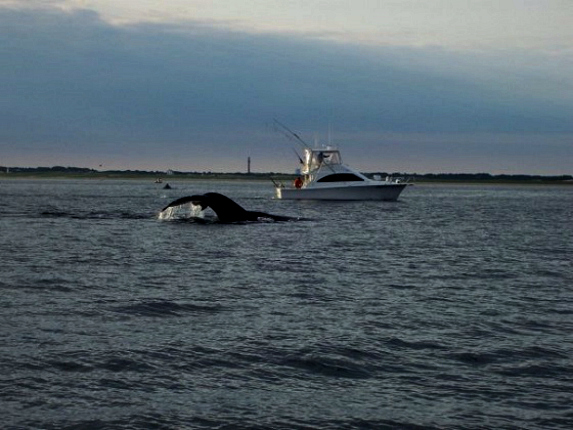
Bluefish are pretty common at Provincetown too. We often catch them while trolling tubes along the drop off, which is located just offshore Herring Cove Beach.
The bottom of the sea floor off this area of Provincetown plummets from 20 to more than 150 feet deep. The structure here is like a sheer cliff edge, just located underwater.
Atlantic mackerel, herring and sand eels are common here. There's a strong current that runs right along the drop off, which definitely helps the fishing.
Back in 2017 large schools of very big striped bass could be found most mornings during late spring and early summer off the coast of Provincetown and nearby Truro.
During that time period we ran quite a few My Fishing Cape Cod group fishing trips to this area. You can see a preview of the action by clicking play below.
The striper bite the last few years in the Provincetown area has not been as crazy and wild as it was 4-8 years ago.
However, the fishing often comes and goes in cycles, so I would think crazy topwater action like what's shown in the above video will eventually happen again.
Provincetown Fishing Tips & Strategies for Tuna
Keep an eye peeled for tuna because they swim incredibly close to shore here. Some summers the tunas are plentiful with many footballs and giants in the area. Other years are less productive.
Trolling spreader bars or soft plastics like Slug-Gos and Hogy's along the surface is a good way to target smaller bluefins off Provincetown at places like Stellwagen Bank.
This is how I caught my first tuna ever, while fishing with my dad, friend Jay, and his dad Pat. It was caught on a Hogy trolled right along the surface at about 5mph at the southeast corner of Stellwagen Bank.
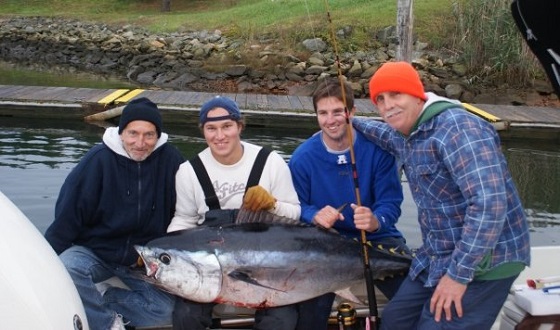
The most common way to target giants off Provincetown is to drift with live bait. It's usually not too difficult to jig up live bait like mackerel or whiting. During the fall some guys will anchor up in deep water and start chumming.
Fish a live bait down deep under a balloon or along the surface using a kite. You may have to spend an entire season floating out there before you get bit, but when you do get a bite there's a good chance the tuna will be huge.
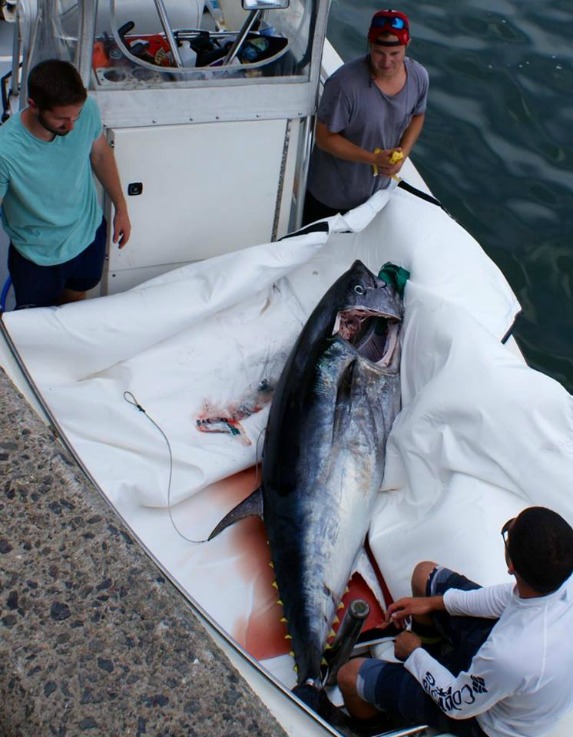
In Conclusion
I did not talk much about it in this article, but there is also some good freshwater fishing located nearby Provincetown. Feel free to make a post inside our members forum if you need help with freshwater.
When you cast a line from a Provincetown beach, you are in essence casting a line at the edge of America. Fishing Provincetown is a unique and sometimes wild experience.
Visiting Provincetown, its shops, restaurants and bars is also a pretty wild and unique endeavor. The town has a lot of character and you never know what you may see next.
If you are a member of My Fishing Cape Cod and need assistance planning a trip to Provincetown then drop me a line at [email protected]. I'm happy to help!
Tight lines

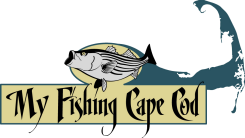



Very cool read Ryan. I’ve been wanting to fish P-Town for a while now. Maybe Nick and I will take a trip up to race point this summer.
Yes Nick told me he’s back in town! That’s awesome. It’s a great place to fish and I’m sure you’d enjoy exploring around the area.
Here we are once again getting ready to fish the outer beaches of Cape Cod , well in my mind anyhow.
This was the time in the past when one would begin to secure a place to stay near the beach when the vacation and long week end came around . Especially during the fall runs and early spring run of fish migration. WE had over many years established many good contacts that gave us good rates for the time we would spend at a local beach house that was used just for sleeping in most cases and at least one hot meal a day , the time out on the beach was mostly cold cuts on Sweet Portuguese bread.
The tern population has increased in numbers and hopefully when they set up to lay eggs , that the weather allows a good survival rate and an early and or short closure of the beach. keep in mind if the weather disrupts the nesting areas that they will re-nest and drop more eggs which drags out the closure areas.
Reading the beach for the best fishing during the on coming year depends on if you can ride the beach at low water and simply look and find the gates[breaks] in the various sand bars and by using your mileage indicator on the truck and marking them down on paper you will have the beginning of some good places to start your journey when you come down Then again what we would do when we arrived to actually fish, was place markers so many feet away in the dunes, with out walking on them. Use your imagination on what you use for markers . The open gates along these low lying sand bars will hold fish once the water fills in and they are not always parallel to the beach. You can also determine where the hollow spots are located at times behind or in front of the sand bars with visual gates to these areas, I think to much is made about how to read a beach , so I posted it in a more simplified manner.
Look for the sand bar where water will be curling over it and then look for an area where the water has no movement. It is this area that I call a gate that is lower once it fills in that allows the fish to follow what ever course along the bar on the outside and then use this gate to get in behind the bar. So overall once you determine where the bars and gates are. search the whole inside area for holes . Some times one part of the gate will produce more fish, depending upon how the water enters them to fill up the inside. If you can find a bar that comes directly from the shore and along its projection you can see another open spot , note that as well for when the tide fills it up you will have another gate the fish will use in search of food . At times the fish will use one gate to get behind the bar and another to get out , Peace and Prayers
Terrific comment Carl, thank you! I know “reading the beach” is a topic a lot of people are interested in learning more about. And I bet that sweet Portuguese bread was pretty delicious! Thanks again for the information.
Good afternoon to My Fishing Cape Cod fishermen. . Here we are early in the year perhaps waiting for the plovers to hatch out and leave and wondering if it is worth the trip to head on down to the Race Or Nauset beaches to wet the lines.
Going by past events over many years heading down to those beaches were always another adventure for the whole family. If we found the beach limited to fishing, we would use this time to investigate other locations that would produce during this time frame . Like Ryder beach or Great Island for example. Most of those trips meant more walking and less riding , but we were never disappointed in what we would see.
One thing was to make those trips during the low water times and mark out the spots for the early and late fall trips when the fish were going back home. At times it became scouting trips to see who would see and find any new cuts or gates in the sand . It meant less time spent on scouting and more time fishing in the fall run. It also helped you to understand how to actively fish with the seals. Seals are a smart creature and one Methode we employed was stop let out one walker to fish to where you would drive down the beach to stop and then the one walking would drive to the next location.
Depending on time of day and how we felt that distance could mean one mile or a little less. The one driving down the beach would get the most attention and the seals would follow until you stopped. Meanwhile the person walking and fishing would find themselves with less seal around. It takes a little practice , but it does work once you understand, when to start fishing after you are let off. Peace and Prayers
Some intersting notes. At one time we had a sand road behind the dunes which ran from the light house to High head that was used to pick wild cranberries in season and low lying blueberries and Beach Plums. At times it was also used to get around the plover closers and then it was closed off , except from the Race point beach to the light house on the point. The light house can be rented and makes for an interesting place to fish during the fall when everything is moving to go home. The Light house at the point gives one a great view of the herring cove beach and also race point beach as well. It also holds some of the deepest water from shore and also for the boats as it constantly changes from the current shift on daily basis. It also has and will hold some of the larger bass during the spring and fall migrations. Peace and Prayers
Good morning Ryan , back in another time the same places you marked on your map also held some of the best Fluke fishing here on the cape and all from shore. Both the sea worm and sand eel population in and around the outflow at Herring Cove, we called this place Hatches Harbor [ This has its own history over the years and is worth investigating ] was exceptional along with fishing for bass, blue fish and sand dabs.
You just needed to locate them at the low water prior to the change back to high water mark. The worms were so good at one time we would use 8 and 9]0 hooks with 6 to 8 worms secured only through the head and cast only a short distance from the beach on a single fish finder rig with or without a float for big momma.
Finding the pods of sand eels depended upon how good your sand eel rake worked when you needed to rake in rough water / My rake had a custom Maggy Ribb 10 foot aluminum handle and we worked a two buddy system one raked while the other one held the special basket that the eels and sea worms were released into. Somewhere here I explain how to keep them for long periods of time in the ANGLER’s DEN in forum.
Often we would have minke whales come with in patting distance checking out the chum line you were making from the raking at first it is rather scary , but they are friendly. It just the recent invasion of whites and seals that you need to be aware of. Most seals go to sleep at night in pods flaoting in the water.
WE did most of our raking during the stealth hours for best numbers, once you get used it its a breeze. In the early and late fall months plugging would take some nice prizes and I will say that never have anyone tell you that you cannot take blue fish on plugs at night, Think polaris style plugs that make a lot of noise Needles and Sliders [ These are plugs we made a whole bunch of years ago. That just show the tip of the plug out of the water at rest , but would slide to the top upon retrieve and start a commotion. Work it like a fresh water popper and when you can use the same approach let the ripples fade before working again , Some of the Guppies can be worked that way .
Another tool on the outer beaches if fishing from the sand is to have Hopkins stubby version or long will work along with kastmasters, and diamond jigs, all with a 7/0 single hook, the longer version of the 7/0 hook, not the shorter one. Both single tied bucktail or feathers, black at night white during the day light [early day break .] Hardly moving on the bottom have taken some rather larger specimens . Allow the fish to pick it up from the sand, like they do when they are snouting out the sand eels .
I will leave for now , should you like we could provide some futher incite to what you have started above as being informative for those among us looking to expand there fishing skills.
Make sure the drags are not set to tight , but tight enough to stick the fish. Peace and Prayers
Hello Ryan
Will be camping in P.town Aug 6-11 being from northern N.H. surf casting is all new to me wondering if you could offer a tackle list I would need to aquire to take a crack at catching some fish from shore
Thanks
Jon
Hey Jon,
I would pick up a topwater lure, a swimmer, and a jig. For example:
Topwater: http://www.canalbaitandtackle.com/guppy-lures-2-oz/
Swimmer: http://www.canalbaitandtackle.com/canal-magic-swimmer-transparent-white-6-5-1-5oz-165mm/
Jig: http://www.canalbaitandtackle.com/savage-sandeel-6-1-5oz-se-j160-se/
I use a 9ft rod for surfcasting the beaches: http://www.canalbaitandtackle.com/lamiglas-surf-pro-xra-9-spinning-1-3-5oz/
And I use the Van Staal VR175 reel: https://www.themightyfish.com/products/van-staal-vr-bailed-spinning-reel
Any similar rod/reel combo will work. You just want to make sure you can pack around 300 yards of 30 pound Power Pro Braid (http://www.canalbaitandtackle.com/power-pro-braid-30-lb-300yd-spool-green/) onto your chosen reel.
For leader I recommend 30lb fluorocarbon http://www.canalbaitandtackle.com/seaguar-blue-label-original-fluorocarbon-leader-30lb-25yds/
I would also recommend enrolling in our free surfcasting video course https://myfishingcapecod.com/free-surfcasting-video-course/
Our forum is also a great resource. Post your question in our forum and I’m sure you’ll get many more helpful replies. https://myfishingcapecod.com/forum
Tight lines!
Hey Ryan,
I will be spending about a week in Provincetown around the July 4th timeframe. Am interested in saltwater fishing from a small boat for a few days. Is it a good time to fish and what can I expect to catch? Do you have recommendations on bait for that time of year and for boat fishing (locations, etc.) Planning on renting from the local marina in Provincetown.
Thanks!
Grant
Hey Grant,
July can be a great time to fish. No guarantees, but July of 2014 was excellent in the Ptown area.
You can target striped bass and bluefish along the drop off Wood End, Herring Cove Beach and up towards Race Point. You could also try for flounder, fluke and other bottom dwelling fish inside Ptown harbor.
Fresh sand eels, red tube and worm, and A27 vertical jigs with the green tube tail would be great lures/baits to have onboard.
You could also try jigging up mackerel using Sabiki rigs in the area around Ptown. Mackerel are fun to catch and make great live bait for striped bass.
I would definitely check in with Nelsons Bait and Tackle during your stay. The guys in our forum are also very helpful.
Best,
Ryan
I will be staying in Provincetown from Sept 27 thru Oct 3. I want to do some surf casting. Will this be a good time of year?
Possibly the best.
You’ll have great opportunities from shore or from boat Clay.
Let me know how it goes!
Will be in MA for 2 weeks in mid March and interested in knowing from an avid angler such as yourself as to what there may be to fish for. Will be in North Andover and aren’t familiar with the area. Wasn’t sure if any surf or river fishing is good at this time. Thanks.
Hey Nick – March is a bit early for most saltwater fishing. If you are real ambitious, you could fish the back waters of estuaries for holdover stripers, however it will take some work to find and catch them.
Freshwater is probably a better bet. I am more familiar with fishing in the Cape Cod area, however I think any local ponds in the North Andover area would be worth checking out. Largemouth bass might be stirring by then, and depending on the weather you might be able to fish a freshly stocked pond for trout.
Just check out the Mass Division Marine Fisheries for their trout stocking plans http://www.mass.gov/eea/agencies/dfg/dfw/hunting-fishing-wildlife-watching/fishing/northeast-district-stocking-.html